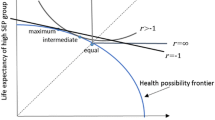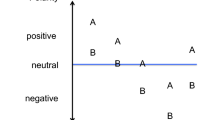Abstract
Contrary to traditional economic postulates, people do not only care about their absolute position but also about their relative position. However, empirical evidence on positional concerns in the context of health is scarce, despite its relevance for health care policy. This paper presents a first explorative study on positional concerns in the context of health. Using a ‘two-world' survey method, a convenience sample of 143 people chose between two options (having more in absolute terms or having more in relative terms) in several health and non-health domains. Our results for the non-health domains compare reasonably well to previous studies, with 22–47 % of respondents preferring the positional option. In the health domain, these percentages were significantly lower, indicating a stronger focus on absolute positions. The finding that positional concerns are less prominent in the health domain has important implications for health policy, for instance in balancing reduction of socio-economic inequalities and absolute health improvements.

Similar content being viewed by others
References
Veblen, T.: The theory of the leisure class. An economic study of institutions. Viking, New York (1912). Original work published 1899
Hirsch, F.: Social limits to growth. Harvard University Press, Cambridge, MA (1976)
Frank, R.H.: Choosing the right pond. Human behavior and the quest for status. Oxford University Press, New York (1985)
Brouwer, W.B.F., Schut, F.T.: Priority care for employees: a blessing in disguise? Health Econ. 8(1), 65–73 (1999)
Macintyre, S.: The black report and beyond what are the issues? Soc. Sci. Med. 44(6), 723–745 (1997)
Mackenbach, J.P., Stronks, K.: A strategy for tackling health inequalities in the Netherlands. BMJl 325(7371), 1029–1032 (2002)
Mackenbach, J.P., Bakker, M.J.: Tackling socioeconomic inequalities in health: analysis of European experiences. Lancet 362(9393), 1409–1414 (2003)
Solnick, S.J., Hemenway, D.: Are positional concerns stronger in some domains than in others? Am. Econ. Rev. 95(2), 147–151 (2005)
Grolleau, G., Said, S.: Do you prefer having more or more than others? Survey evidence on positional concerns in France. J. Econ. Issues 42(4), 1145–1158 (2008)
Powdthavee, N.: Ill-health as a household norm: evidence from other people’s health problems. Soc. Sci. Med. 68(2), 251–259 (2009)
Carrieri, V.: Social comparison and subjective well-being: does the health of others matter? Bull. Econ. Res. 64(1), 31–55 (2012)
Christakis, N.A., Fowler, J.H.: The spread of obesity in a large social network over 32 years. N. Engl. J. Med. 357(4), 370–379 (2007)
Clark, A.E., Etilé, F.: Happy house: spousal weight and individual well-being. J. Health Econ. 30(5), 1124–1136 (2011)
Cohen-Cole, E., Fletcher, J.M.: Is obesity contagious? Social networks vs. environmental factors in the obesity epidemic. J. Health Econ. 27(5), 1382–1387 (2008)
Blanchflower, D.G., Oswald, A.J., Van Landeghem, B.G.: Imitative obesity and relative utility. J. Eur. Econ. Assoc. 7, 528–538 (2009)
Lanza, H.I., Echols, L., Graham, S.: Deviating from the norm: body mass index (BMI) differences and psychosocial adjustment among early adolescent girls. J. Pediatr. Psychol. 38(4), 376–386 (2013)
Solnick, S.J., Hemenway, D.: Is more always better?: a survey on positional concerns. J. Econ. Behav. Organ. 37(3), 373–383 (1998)
Bobinac, A., van Exel, N.J.A., Rutten, F.F.H., Brouwer, W.B.F.: Caring for and caring about: disentangling the caregiver effect and the family effect. J. Health Econ. 29(4), 549–556 (2010)
Bobinac, A., van Exel, N., Job, A., Rutten, F.F., Brouwer, W.B.: Health effects in significant others separating family and care-giving effects. Med. Decis. Making 31(2), 292–298 (2011)
Veenhoven, R.: Advances in understanding happiness. Rev. Québéc. Psychol. 18(2), 29–74 (1997)
Frank, R.H.: Passions within reason: the strategic role of the emotions. Norton, New York (1988)
Thurow, L.: The zero-sum society: distribution and the possibilities for economic change. Basic Books, New York (1980)
Samuleson, W., Zeckhauser, R.: Status quo bias in decision making. J. Risk. Uncertain. 1, 7–59 (1988)
Tversky, A., Kahneman, D.: The framing of decisions and the psychology of choice. Science 211(4481), 453–458 (1981)
Celse, J.: Is the positional bias an artefact? Distinguishing positional concerns from egalitarian concerns. J. Socio Econ. 41(3), 277–283 (2012)
Solnick, S.J., Hong, L., Hemenway, D.: Positional goods in the United States and China. J. Socio Econ. 36(4), 537–545 (2007)
Grolleau, G., Mzoughi, N., Saïd, S.: Do you believe that others are more positional than you? Results from an empirical survey on positional concerns in France. J. Socio Econ. 41(1), 48–54 (2012)
Hillesheim, I., Mechtel, M.: How much do others matter? Explaining positional concerns for different goods and personal characteristics. J. Econ. Psychol. 34, 61–77 (2013)
Bilancini, E., Boncinelli, L.: Ordinal vs cardinal status: two examples. Econ. Lett. 101(1), 17–19 (2008)
Clark, A.E., Senik, C.: Who compares to whom? The anatomy of income comparisons in Europe. Econ. J. 120, 573–594 (2010)
Wagstaff, A.: QALYs and the equity–efficiency trade-off. J. Health Econ. 10(1), 21–41 (1991)
Grolleau, G., Galochkin, I., Sutan, A.: Escaping the zero-sum game of positional races. Kyklos 65(4), 464–479 (2012)
Pauly, M.V.: Who was that: straw man anyway? A comment on evans and rice. J. Health Polit. Policy Law 22, 467–473 (1997)
Author information
Authors and Affiliations
Corresponding author
Appendices
Appendix A
In the questions below, two states of the world are presented (state A and state B). You are asked to choose in which of the two states you would prefer to live. The questions are independent from each other. In each question, please circle either A or B, or if undecided, both A and B. ‘Others’ can be interpreted as the average other person in society.
Which world would you prefer?a
1. | A | Your current yearly income is 30,000 euro, others earn 15,000 euro |
B | Your current yearly income is 60,000 euro, others earn 100,000 euro | |
2. | A | You have 12 years of education (high school), others have 8 years (elementary school) |
B | You have 16 years of education (college), others have 20 years (graduate) | |
3. | A | You have 4 weeks of vacation, others have 2 weeks |
B | You have 6 weeks of vacation, others have 10 weeks | |
4. | A | You are berated by the supervisor 4 times this year, others are berated 8 times |
B | You are berated by the supervisor twice, others are berated once | |
Assume intelligence can be described by IQ on current tests | ||
5. | A | Your IQ is 110, others average 90 |
B | Your IQ is 130, others average 150 | |
Assume physical attractiveness can be measured on a scale from 1 (lowest) to 10 (highest) | ||
6. | A | Your physical attractiveness is 6, others average 4 |
B | Your physical attractiveness is 8, others average 10 | |
7. | A | You are praised by the supervisor 2 times this year, others are not praised |
B | You are praised by the supervisor 5 times this year, others are praised 12 times | |
8. | A | You have 1 week of vacation, others have none |
B | You have 2 weeks of vacation, others have 4 weeks | |
9. | A | Your current yearly income is 20,000 euro, others earn 10,000 |
B | Your current yearly income is 40,000, others earn 80,000 | |
Assume you have a child | ||
10. | A | Your child’s IQ is 110, other people’s children average 90 |
B | Your child’s IQ is 130, other people’s children average 150 | |
11. | A | Your child’s physical attractiveness is 6, others average 4 |
B | Your child’s physical attractiveness is 8, others average 10 | |
Appendix B
The previous questions concerned different aspects of life. The next part of the questionnaire will focus on health- and healthcare-specific situations. In each question, please circle either A or B, or if undecided, both A and B. `Others’ can be interpreted as the average other person in society.
Which world would you prefer?
Assume health can be measured on a scale from 1 (lowest) to 10 (highest) | ||
1. | A | Your health is 6, others average 4 |
B | Your health is 8, others average 10 | |
Assume you need a knee-operation | ||
2. | A | Your waiting time is 6 weeks, others wait 8 weeks |
B | Your waiting time is 3 weeks, others wait 1 week | |
3. | A | Your travel time to the hospital is 30 min, others travel 60 min |
B | Your travel time to the hospital is 15 min, others travel time 5 min | |
4. | A | Your insurance-company covers 50 % of all costs of complementary care (e.g. physiotherapy), others are not covered |
B | Your insurance-company covers 75 % of all costs of complementary care (e.g. physiotherapy), others are fully covered | |
5. | A | You get a four-person room in the hospital, others get a 6-persons room |
B | You get a two-person room in the hospital, others get a private room | |
6. | A | Your health is 4, others average 2 |
B | Your health is 6, others average 8 | |
Assume you need a cataract-operation | ||
7. | A | Your waiting time is 6 weeks, others wait 8 weeks |
B | Your waiting time is 3 weeks, others wait 1 weeks | |
8. | A | You will reach 70 years of age, others average 65 |
B | You will reach 75 years of age, others average 80 | |
Assume you need an open-heart-operation | ||
9. | A | Your waiting time is 6 weeks, others wait 8 weeks |
B | Your waiting time is 3 weeks, others wait 1 week | |
10. | A | Your co-payment for consultation at the physician is 10 euro, others pay 15 euro |
B | Your co-payment for a consultation at the physician is 5 euro, others pay 2.50 euro | |
11. | A | You will reach 80 years of age, others average 75 |
B | You will reach 85 years of age, others average 90 | |
Assume you have a child | ||
12. | A | Your child will reach 80 years, others average 75 |
B | Your child will reach 85 years, others average 90 | |
13. | A | Your child’s health is 6, others average 4 |
B | Your child’s health is 8, others average 10 | |
Rights and permissions
About this article
Cite this article
Wouters, S., van Exel, N.J.A., van de Donk, M. et al. Do people desire to be healthier than other people? A short note on positional concerns for health. Eur J Health Econ 16, 47–54 (2015). https://doi.org/10.1007/s10198-013-0550-8
Received:
Accepted:
Published:
Issue Date:
DOI: https://doi.org/10.1007/s10198-013-0550-8




